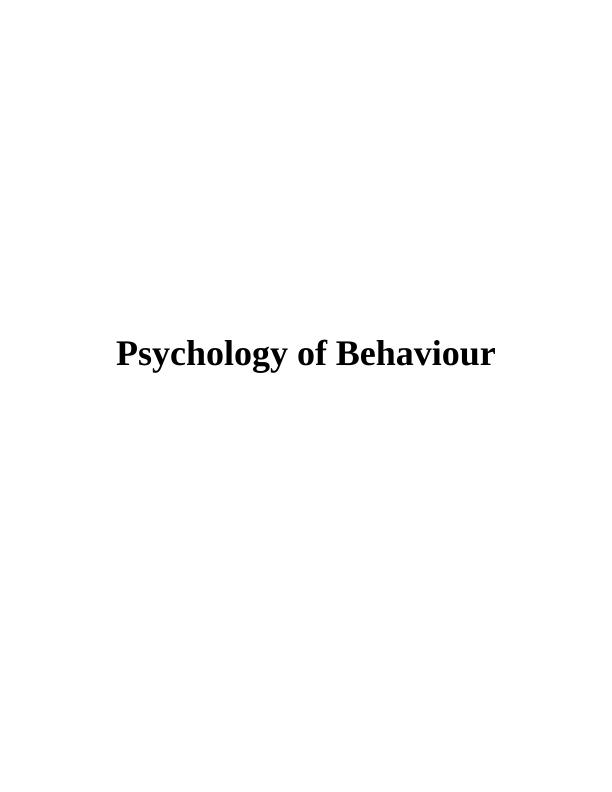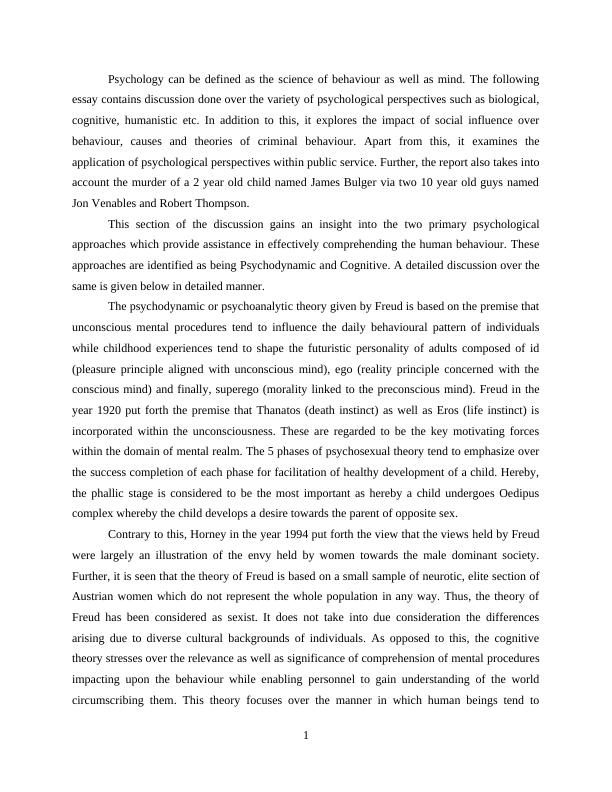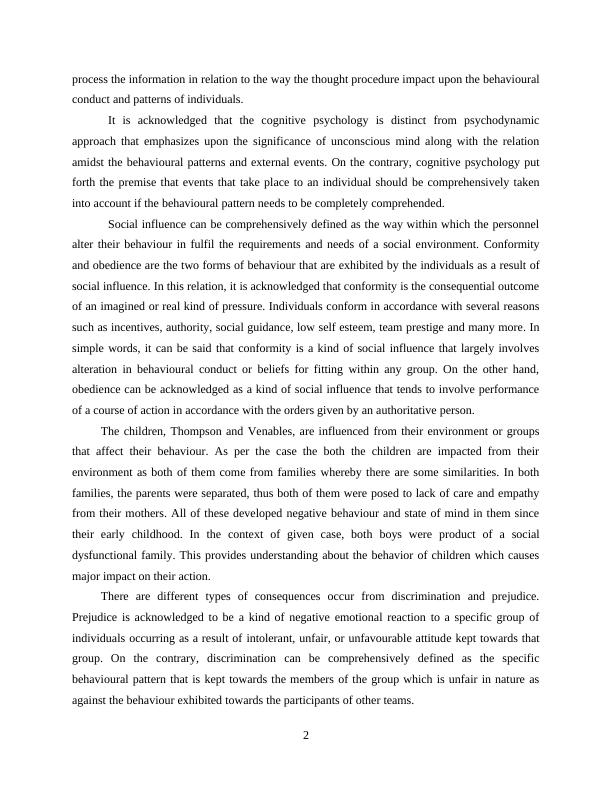Psychology of Behaviour
Added on 2023-01-12
12 Pages4136 Words68 Views
Psychology of Behaviour


Psychology can be defined as the science of behaviour as well as mind. The following
essay contains discussion done over the variety of psychological perspectives such as biological,
cognitive, humanistic etc. In addition to this, it explores the impact of social influence over
behaviour, causes and theories of criminal behaviour. Apart from this, it examines the
application of psychological perspectives within public service. Further, the report also takes into
account the murder of a 2 year old child named James Bulger via two 10 year old guys named
Jon Venables and Robert Thompson.
This section of the discussion gains an insight into the two primary psychological
approaches which provide assistance in effectively comprehending the human behaviour. These
approaches are identified as being Psychodynamic and Cognitive. A detailed discussion over the
same is given below in detailed manner.
The psychodynamic or psychoanalytic theory given by Freud is based on the premise that
unconscious mental procedures tend to influence the daily behavioural pattern of individuals
while childhood experiences tend to shape the futuristic personality of adults composed of id
(pleasure principle aligned with unconscious mind), ego (reality principle concerned with the
conscious mind) and finally, superego (morality linked to the preconscious mind). Freud in the
year 1920 put forth the premise that Thanatos (death instinct) as well as Eros (life instinct) is
incorporated within the unconsciousness. These are regarded to be the key motivating forces
within the domain of mental realm. The 5 phases of psychosexual theory tend to emphasize over
the success completion of each phase for facilitation of healthy development of a child. Hereby,
the phallic stage is considered to be the most important as hereby a child undergoes Oedipus
complex whereby the child develops a desire towards the parent of opposite sex.
Contrary to this, Horney in the year 1994 put forth the view that the views held by Freud
were largely an illustration of the envy held by women towards the male dominant society.
Further, it is seen that the theory of Freud is based on a small sample of neurotic, elite section of
Austrian women which do not represent the whole population in any way. Thus, the theory of
Freud has been considered as sexist. It does not take into due consideration the differences
arising due to diverse cultural backgrounds of individuals. As opposed to this, the cognitive
theory stresses over the relevance as well as significance of comprehension of mental procedures
impacting upon the behaviour while enabling personnel to gain understanding of the world
circumscribing them. This theory focuses over the manner in which human beings tend to
1
essay contains discussion done over the variety of psychological perspectives such as biological,
cognitive, humanistic etc. In addition to this, it explores the impact of social influence over
behaviour, causes and theories of criminal behaviour. Apart from this, it examines the
application of psychological perspectives within public service. Further, the report also takes into
account the murder of a 2 year old child named James Bulger via two 10 year old guys named
Jon Venables and Robert Thompson.
This section of the discussion gains an insight into the two primary psychological
approaches which provide assistance in effectively comprehending the human behaviour. These
approaches are identified as being Psychodynamic and Cognitive. A detailed discussion over the
same is given below in detailed manner.
The psychodynamic or psychoanalytic theory given by Freud is based on the premise that
unconscious mental procedures tend to influence the daily behavioural pattern of individuals
while childhood experiences tend to shape the futuristic personality of adults composed of id
(pleasure principle aligned with unconscious mind), ego (reality principle concerned with the
conscious mind) and finally, superego (morality linked to the preconscious mind). Freud in the
year 1920 put forth the premise that Thanatos (death instinct) as well as Eros (life instinct) is
incorporated within the unconsciousness. These are regarded to be the key motivating forces
within the domain of mental realm. The 5 phases of psychosexual theory tend to emphasize over
the success completion of each phase for facilitation of healthy development of a child. Hereby,
the phallic stage is considered to be the most important as hereby a child undergoes Oedipus
complex whereby the child develops a desire towards the parent of opposite sex.
Contrary to this, Horney in the year 1994 put forth the view that the views held by Freud
were largely an illustration of the envy held by women towards the male dominant society.
Further, it is seen that the theory of Freud is based on a small sample of neurotic, elite section of
Austrian women which do not represent the whole population in any way. Thus, the theory of
Freud has been considered as sexist. It does not take into due consideration the differences
arising due to diverse cultural backgrounds of individuals. As opposed to this, the cognitive
theory stresses over the relevance as well as significance of comprehension of mental procedures
impacting upon the behaviour while enabling personnel to gain understanding of the world
circumscribing them. This theory focuses over the manner in which human beings tend to
1

process the information in relation to the way the thought procedure impact upon the behavioural
conduct and patterns of individuals.
It is acknowledged that the cognitive psychology is distinct from psychodynamic
approach that emphasizes upon the significance of unconscious mind along with the relation
amidst the behavioural patterns and external events. On the contrary, cognitive psychology put
forth the premise that events that take place to an individual should be comprehensively taken
into account if the behavioural pattern needs to be completely comprehended.
Social influence can be comprehensively defined as the way within which the personnel
alter their behaviour in fulfil the requirements and needs of a social environment. Conformity
and obedience are the two forms of behaviour that are exhibited by the individuals as a result of
social influence. In this relation, it is acknowledged that conformity is the consequential outcome
of an imagined or real kind of pressure. Individuals conform in accordance with several reasons
such as incentives, authority, social guidance, low self esteem, team prestige and many more. In
simple words, it can be said that conformity is a kind of social influence that largely involves
alteration in behavioural conduct or beliefs for fitting within any group. On the other hand,
obedience can be acknowledged as a kind of social influence that tends to involve performance
of a course of action in accordance with the orders given by an authoritative person.
The children, Thompson and Venables, are influenced from their environment or groups
that affect their behaviour. As per the case the both the children are impacted from their
environment as both of them come from families whereby there are some similarities. In both
families, the parents were separated, thus both of them were posed to lack of care and empathy
from their mothers. All of these developed negative behaviour and state of mind in them since
their early childhood. In the context of given case, both boys were product of a social
dysfunctional family. This provides understanding about the behavior of children which causes
major impact on their action.
There are different types of consequences occur from discrimination and prejudice.
Prejudice is acknowledged to be a kind of negative emotional reaction to a specific group of
individuals occurring as a result of intolerant, unfair, or unfavourable attitude kept towards that
group. On the contrary, discrimination can be comprehensively defined as the specific
behavioural pattern that is kept towards the members of the group which is unfair in nature as
against the behaviour exhibited towards the participants of other teams.
2
conduct and patterns of individuals.
It is acknowledged that the cognitive psychology is distinct from psychodynamic
approach that emphasizes upon the significance of unconscious mind along with the relation
amidst the behavioural patterns and external events. On the contrary, cognitive psychology put
forth the premise that events that take place to an individual should be comprehensively taken
into account if the behavioural pattern needs to be completely comprehended.
Social influence can be comprehensively defined as the way within which the personnel
alter their behaviour in fulfil the requirements and needs of a social environment. Conformity
and obedience are the two forms of behaviour that are exhibited by the individuals as a result of
social influence. In this relation, it is acknowledged that conformity is the consequential outcome
of an imagined or real kind of pressure. Individuals conform in accordance with several reasons
such as incentives, authority, social guidance, low self esteem, team prestige and many more. In
simple words, it can be said that conformity is a kind of social influence that largely involves
alteration in behavioural conduct or beliefs for fitting within any group. On the other hand,
obedience can be acknowledged as a kind of social influence that tends to involve performance
of a course of action in accordance with the orders given by an authoritative person.
The children, Thompson and Venables, are influenced from their environment or groups
that affect their behaviour. As per the case the both the children are impacted from their
environment as both of them come from families whereby there are some similarities. In both
families, the parents were separated, thus both of them were posed to lack of care and empathy
from their mothers. All of these developed negative behaviour and state of mind in them since
their early childhood. In the context of given case, both boys were product of a social
dysfunctional family. This provides understanding about the behavior of children which causes
major impact on their action.
There are different types of consequences occur from discrimination and prejudice.
Prejudice is acknowledged to be a kind of negative emotional reaction to a specific group of
individuals occurring as a result of intolerant, unfair, or unfavourable attitude kept towards that
group. On the contrary, discrimination can be comprehensively defined as the specific
behavioural pattern that is kept towards the members of the group which is unfair in nature as
against the behaviour exhibited towards the participants of other teams.
2

End of preview
Want to access all the pages? Upload your documents or become a member.
Related Documents
Psychology of Behaviourlg...
|8
|3828
|37
Essay on Theories of Personalitylg...
|6
|1513
|363